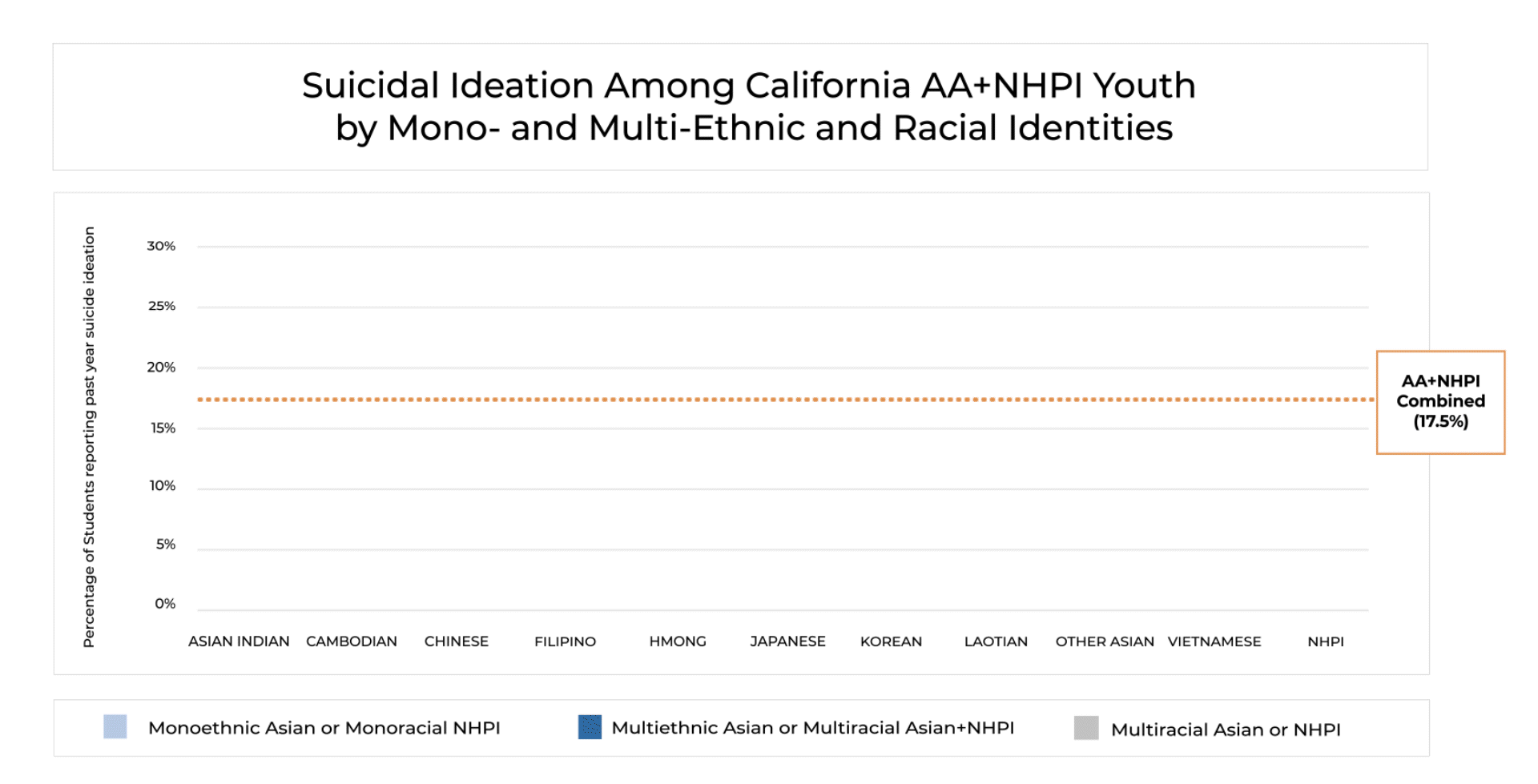Invisible struggles: Data disaggregation reveals hidden suicide risk among Asian American, Native Hawaiian and Pacific Islander youth
New research published today in JAMA Network Open highlights the critical need for data disaggregation — analyzing data by specific racial and ethnic groups rather than a single category — to reveal hidden risks of suicidal ideation among Asian American, Native Hawaiian, and Pacific Islander (AA+NHPI) adolescents.
By examining nine distinct AA+NHPI subgroups, the study, led by researchers at the Alcohol Research Group, a program of the Public Health Institute, reveals significant differences in suicidal ideation risk, providing mental health practitioners valuable insights for creating more targeted and effective prevention strategies. Data were disaggregated by specific AA ethnic subgroups (Asian Indian, Chinese, Filipino, Japanese, Korean, NHPI, Other Asian, Southeast Asian, and Vietnamese) and analyzed by single versus multiple racial and ethnic identities.
Suicide is a leading cause of death among AA+NHPI adolescents, yet research often groups these populations due to small sample sizes or limited data access. This practice obscures significant and critical nuances and overlooks serious risks within AA+NHPI subgroups.
Of the almost 78,000 adolescents surveyed, 17.5% reported suicidal ideation when AA and NHPI youth were grouped together. However, when analyzing groups separately, findings showed:
- 3% of NHPI adolescents with a single racial identity reported experiencing suicidal ideation compared to 27.3% of those with multiple racial identities
- Among AA subgroups, suicidal ideation varied significantly across ethnic groups, with 21.8% of Filipino adolescents reporting suicidal ideation, compared to 13.6% of Asian Indian adolescents
- Adolescents with multiethnic and multiracial identities faced a higher risk of suicidal ideation across all groups, with rates increasing by two percentage points among Filipino adolescents (from 21.2% for single-ethnicity to 23.5% for multiracial) and by nine percentage points among Chinese adolescents (from 13.7% for single-ethnicity to 23.1% for multiracial)

Camillia K. Lui, PhD
“Advocates from AA+NHPI community-based organizations have long raised the issue of suicidal behaviors affecting AA+NHPI youth in California, yet beyond the stories, the epidemiological data were not available to demonstrate the need,” said lead author and ARG Scientist Camillia K. Lui, PhD. “This lack of visibility perpetuates the myth that these adolescents are immune to suicide and further conceals the unique risks they experience.”
The findings build on previous studies that found AA+NHPI adolescents are not a monolithic group, and that those who identify with marginalized or multiracial or multiethnic groups often face unique challenges. These youth often struggle with a sense of belonging and report higher rates of suicidal thoughts compared to their peers.
“For AA+NHPI adolescents, factors like the model minority myth, pandemic isolation, intergenerational trauma, anti-Asian hate, and suicide stigma uniquely shape their mental health challenges,” Lui explained. “Unfortunately, without detailed data to capture these realities, schools and mainstream mental health systems may struggle to fully address the unique needs of these youth.”
The research team calls for advancing data equity in public health research by collecting detailed racial and ethnic categorizations of AA+NHPI subgroups. They advocate for making these data available and accessible to better identify suicide risks that might otherwise remain unaddressed, and thereby develop more effective, culturally relevant interventions. Insights from these efforts can inform prevention and intervention strategies tailored to the unique challenges faced by AA+NHPI adolescents.
“We hope our study will guide future research and data equity strategies that genuinely reflect the diversity of AA+NHPI communities, and in turn, lead to stronger prevention and intervention efforts to reduce suicide among AA+NHPI adolescents,” Lui said.
The research team examined responses gathered through the California Healthy Kids Survey from 9th and 11th graders during the 2017-18 and 2018-19 school years. Suicidal ideation was captured from the following survey item: “During the past 12 months, did you ever seriously consider attempting suicide?”
Read the full study: Lui, C.K., Ye, Y., Gee, J., Cook, W.C, Tam, C.C., Sun, S., Miranda, R., Subica, A., Mulia, N. (2024). Unmasking Suicide Ideation among Asian American, Native Hawaiian, and Pacific Islander Adolescents through Data Disaggregation: https://doi.org/10.1001/jamanetworkopen.2024.46832
—–
ARG is a program of the Public Health Institute, an independent nonprofit organization, dedicated to promoting health, well-being and quality of life for people throughout California, across the nation and around the world. Please visit phi.org.







